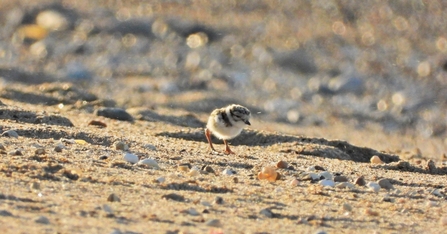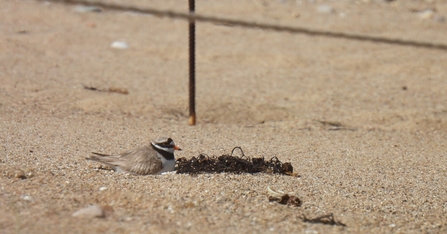This success was in part due to beach cordons used around nesting areas. The population is the last in the Channel Islands, and with only one pair fledging chicks last year, improving the breeding success is of great importance. This year, the Alderney Wildlife Trust and States of Alderney worked in partnership to trial the use of cordons around nesting sites to help secure the species’ future on Alderney.
Golden Year for Alderney’s Nesting Ringed Plovers

© Daniel Whitelegg
The results were very positive - all pairs nesting within cordons hatched out their eggs and reared chicks to fledging. On beaches with cordons, those which nested outside did not hatch any eggs. Furthermore, nests within the cordons survived three-times longer on average than those outside. In total nine chicks fledged from six pairs; the most since detailed observations began in 2017.
There were record numbers of nests (15) and eggs (50) indicating birds may be becoming more trusting of these sites – and more willing to invest time and energy into rearing chicks here as a result.

© Daniel Whitelegg
Cordons were placed around established breeding areas to protect them. It was exciting to see the most successful pair from 2020 and 2021 nesting inside the cordons and rearing three chicks this year. Safeguarding experienced pairs will help Alderney’s breeding population to grow. Encouragingly, a pair that first nested outside the cordons and lost the nest to high tides, chose to nest within a cordon for their second attempt. This was successful, fledging two chicks.
This success would not have been possible without the backing of Alderney’s community. Throughout the breeding season there was much interest and support for the Plovers.
Incidences of people entering the entirely voluntary cordons was very low and the public were actively avoiding the nesting zones. We are very grateful for the encouragement received throughout the project.
Proposals are being drawn up to continue this scheme next year and we hope that this year’s success will be continued.

